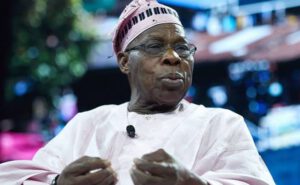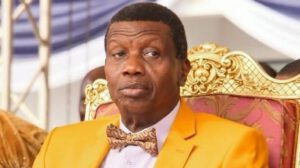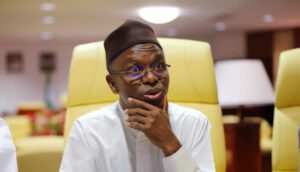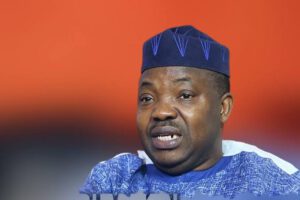Restructuring has been a recurring issue since the start of the fourth republic, especially in the administration of President Muhammadu Buhari. This led to the All Progressives Party (APC) setting up a restructuring committee in 2017 but the recent ENDSARS protest seems to have added a new dimension and urgency to the agitations, Gabriel Atumeyi writes.
On Thursday, 8th of October, a series of mass protests broke out across the nation demanding an end to SARS, the Police Special Anti-robbery Squad, after reports of alleged shooting and killing of two young Nigerians surfaced online.
Three days later, the federal government and the inspector general of Police, Mohammed Adamu, announced the disbandment of the dreaded unit to appease the protesting youths. But despite this announcement, the protest took a renewed vigour, as more youths trooped out en mass and continued to occupy major public centres in Lagos, Abuja and states of the South East, South West and South South, with placards and demands ranging from “End Corruption” to “End Bad government.”
The situation snowballed into the Lekki toll gate massacre of 20th October, where about seven protesting youths were allegedly shot and killed by military personnel. The next day saw thugs and hoodlums taking over the streets of Lagos in a day of rage; unleashing anarchy and not sparing any public or private property in their path. BRT buses, the palace of the Oba of Lagos, as well as several broadcasting and police stations were touched or totally destroyed.
In the aftermath of the attacks, allegations of who is responsible for the mayhem have continued to point back and forth, even degenerating into a regional ‘war of words.” But one word that seems to resonate is restructuring, hardly a surprise as it always does everytime there is a major controversy or crisis in the Nigerian polity.
Restructuring as a controversial term in Nigeria
Restructuring is arguably one of the most controversial terms in Nigerian politcal history and has been sustained in different forms at different times, and to different people it means different things. As former President Olusegun Obasanjo put it in 2017 in an interview with Channels Television, “I have spoken to six different people who talk about restructuring and six of them gave me different points of view.”

Obasanjo
To some people, restructuring means a return to regionalism and regional autonomy of the post- independence constitution. To others, it means devolution of powers; the transfer of more responsibilities to the states, to some it means resource control, others see it as greater autonomy for local governments and a creeping new point of view as expressed by the general overseer of the Redeemed Christian Church of God, Pastor Enoch Adeboye, at a symposium to mark the 60th Independence anniversary of Nigeria on the eve of the EndSARS protest, says it is a new system of government.
“Why can’t we have a system of government that will create what I call the United States of Nigeria?
“It is either we immediately restructure or break up, God forbid. In restructuring, why don’t we have a new kind of democracy? At the federal level, why don’t we have a president and prime minister?” he queried.

Adeboye
Adeboye’s sermon, in retrospect, seems to be prophetic, for five days later, the EndSARS protest erupted, demanding an end to the brutality of a police force under the control of the federal government which has been accused of ethnic hegemony and spiralled into carnage and mayhem, pushing the Nigerian state to the brink.
While in the past virtually all prominent politicians, statesmen and even clergymen ranging from Ibrahim Babangida, Atiku Abubakar, president-general of Ohanaeze Ndigbo, Dr. John Nwodo; elder statesman and Afenifere leader, Chief Ayo Adebanjo; former governor of Ondo State, Dr. Olusegun Mimiko; former Commonwealth Secretary-General, Chief Emeka Anyaoku, and Second Republic governor of the old Kaduna State, Alhaji Balarabe Musa, added their voice to the issue, the post 2015 political dispensation has witnessed increasing new voices calling for restructuring. Many have attributed the rising calls to the persistent security challenges in the country and the governance style of the president, and all these issues were amplified on the eve of the EndSARS protests.
Just about two weeks after the Lekki shooting, the coalition of Yoruba organisations in the Diaspora, Yoruba One Voice (YOV), released a statement criticising President Muhammadu Buhari and the ruling All Progressives Congress (APC) for their lackadaisical approach to the call for restructuring and devolution of powers in Nigeria. The group also warned that the Yoruba nation might be pushed to secede.
Also, the convener, #RevolutionNow, Mr. Omoyele Sowore, while speaking at a programme organised by a rights group, Coalition for Revolution (CORE), said the recent #EndSARS protests had further exposed the need for Nigeria to urgently change its current constitution if it hopes to progress and develop as the 1999 Constitution is not leading the country anywhere.
Kaduna State governor, Nasir El-Rufai, who is the chairman of the 2017 APC restructuring committee, without really emphasising on the word restructuring, said the ENDSARS crisis has shown that the time is ripe for the establishment of state police. Which means devolution of some powers to state governments.

The governor made this call during a closed-door meeting with governors of the 19 northern states, chief of staff to the president, and other northern stakeholders at the Council Chamber of Sir. Kashim Ibrahim House, Kaduna, on Monday.
He said, “Is it not time to make the establishment of state police a key part of policing reforms?
“Is this not an opportunity for a redesign of the security architecture in a collaboration between the states and the national government to vastly expand police numbers, equipment and technology?”
For Zik Gbemre, coordinator of Niger Delta Peace Coalition, NDPC, “The relationship between #ENDSARS and restructuring would be that the later encompasses the former.”
He argued that there has always been a struggle for restructuring, “much broader spectrum of agitations intended to reorganise the entire structure of the Nigerian entity.
“Worthy of note is that the call for restructuring encapsulates everything wrong in the country and needs to be addressed, including whether it should be state police or not, and of course the issue of funding. Hence, some people believe that the #EndSARS thing was a hoax because the demands were escalated but there is no dispute that #EndSARS is subsumed in restructuring.”
Spokesman for the Pan Yoruba Socio-Political Organisation, Afenifere, Mr. Yinka Odumakin, speaking recently, said, “#EndSARS is a product of Nigeria and its contradictions. We don’t need some of these national gangsters in a restructured polity. The protesters could not have linked it but they have raised a fundamental issue in restructuring.”

Odumakin
National chairman of Pan Niger Delta Forum, PANDEF, and former military administrator of Akwa Ibom State, Air Commodore Idongesit Nkanga, retd, speaking to one of the national dailies recently, said the forum had last week issued a statement that since some states want SARS and some don’t, it indicates time for state police.
“Let us, therefore, urgently embark on devolution of powers. Let us have true federalism with state police and call it by its real name.”
Speaking to 365Daily, Mr Jide Ojo, a political analyst and development expert, said the EndSARS protest has heightened the call for restructuring which could take several forms ranging from the devolution of powers to the creation of state police, to the entrenchment in the constitution of the rotation of power between the six geopolitical zones, to the reconfiguration of the structure and size of the national legislature and federal cabinet.
He said, “Even though the EndSARS is all about ending police brutality, extortion and corruption, you will recall that towards the tail end of that protest, they took up the wider governance issue – end to bad governance – and of course, the political gladiators interpreted it in their own ways.
“It is said that if there had been state police, knowing full well the environment, they would have been able to bring it after under control more expeditiously than the federal police was able to do. That has also heightened the call for restructuring and also, when you look at the heightening of the demand of the South East for Igbo presidency in 2023, it is also part of the fallout which was central in their interaction with the federal delegation going round the six geopolitical zones in the aftermath of the End SARS crisis,” he added.
According to the former director general of the National Orientation Agency (NOA), Mr Mike Omeri, who also spoke to 365Daily, restructuring is necessary and imperative, whether it be police reform to give policing powers to states; local government and even districts as it is in some countries, or the restructuring of powers vested in a particular office to check misuse by the occupant.